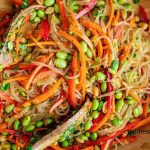Coconut flakes are larger pieces of shaved coconut meat that have been naturally dried, while shredded coconut is smaller and thinner. Knowing the difference between these two forms is important for achieving the desired texture and flavor in your recipes.
In addition to being a versatile ingredient, coconut flakes also make a healthy snack option. They are packed full of flavor, unsweetened, sulfur free, and can be used to decorate cakes and pies, as well as in granola and trail mixes.
Whether you’re looking to add a tropical twist to your dishes or enjoy them on their own, coconut flakes offer a delicious and nutritious option.
Introduction To Coconut Flakes
Enjoy the rich flavor of Coconut Flakes, a versatile ingredient perfect for snacking, baking, and decorating. These unsweetened and sulfur-free flakes add a delightful crunch to granola, trail mixes, and desserts. A healthy and tasty addition to your pantry.
What Are Coconut Flakes?
Coconut flakes are a delicious and versatile ingredient that adds a tropical twist to a variety of dishes. These thin and larger-shaped flakes are made by grating the meat of mature coconuts. The grated coconut is then dried out to remove the moisture, resulting in light and crispy flakes.
Benefits Of Coconut Flakes
There are numerous benefits to incorporating coconut flakes into your diet.
1. Nutrient-rich: Coconut flakes contain essential nutrients like fiber, vitamins, and minerals. They are a good source of iron, manganese, and copper, which are important for overall health and well-being.
2. High in healthy fats: These flakes are packed with healthy fats, including medium-chain triglycerides (MCTs). MCTs are easily digested and can provide quick energy for your body.
3. Aids in digestion: The fiber content in coconut flakes promotes healthy digestion and helps prevent constipation. It can also support the growth of beneficial gut bacteria.
4. Boosts immunity: Coconut flakes contain lauric acid, which has antimicrobial and antiviral properties. Lauric acid can help strengthen your immune system and protect against infections.
5. Supports heart health: The healthy fats in coconut flakes may help improve cholesterol levels, reduce inflammation, and lower the risk of heart disease.
6. Enhances skin and hair: The natural oils in coconut flakes can moisturize and nourish your skin and hair. Regular consumption of coconut flakes may contribute to healthier, glowing skin and lustrous hair.
7. Delicious and versatile: Coconut flakes add a delightful texture and flavor to both sweet and savory dishes. They can be sprinkled over yogurt, added to smoothies, used as a topping for baked goods, or incorporated into curries and stir-fries.
With their enticing taste and numerous health benefits, coconut flakes are a pantry staple you’ll want to incorporate into your culinary repertoire.
Different Uses Of Coconut Flakes
Coconut flakes have a variety of uses, from decorating cakes and pies to adding flavor and texture to granola and trail mixes. They can also be enjoyed as a healthy snack on their own, as they are unsweetened and sulfur free.
t, on the other hand, is perfect for adding a crunchy and satisfying element to your recipes. In this blog post, we will explore the different uses of coconut flakes and how you can incorporate them into your cooking and baking endeavors.
In Baking
Coconut flakes are a versatile ingredient that can add a delightful tropical twist to your baked goods. Whether it’s cookies, cakes, or muffins, incorporating coconut flakes into your recipes can elevate the flavor profile and texture of your creations. You can either mix them directly into the batter or sprinkle them on top for a beautiful and crunchy finish.
One popular recipe where coconut flakes shine is the classic coconut macaroons. The combination of sweetened shredded coconut and coconut flakes creates a chewy and indulgent treat that is loved by many. These bite-sized delights are perfect for any occasion, from parties to afternoon tea.
In Smoothies And Muesli
If you’re a fan of smoothies or muesli bowls, then adding coconut flakes to your morning routine is a great idea. Not only do they provide a delicious crunch, but they also infuse your breakfast with a tropical flavor. Simply sprinkle a handful of coconut flakes on top of your smoothie or muesli bowl for that extra burst of texture and taste.
Additionally, coconut flakes can also be used to make homemade granola. Mix them with rolled oats, nuts, and dried fruits, and bake until golden and fragrant. The result is a crunchy and flavorful granola that can be enjoyed with yogurt, milk, or eaten straight from the jar as a convenient and nutritious snack.
As A Snack
Speaking of snacks, coconut flakes can be a great standalone treat on their own. They are naturally sweet, slightly chewy, and packed with a tropical aroma. Enjoy them as a guilt-free snack whenever you’re craving something a little indulgent.
You can also take it a step further and toast the coconut flakes for an extra crunch and depth of flavor. Simply spread them on a baking sheet and bake at a low temperature until golden brown. Let them cool and store them in an airtight container for a quick and delicious snack on the go.
As A Cake Decoration
Coconut flakes not only add flavor but also make for a visually appealing cake decoration. Whether you’re making a classic coconut cake or a tropical-themed dessert, sprinkling coconut flakes on top can instantly elevate the aesthetic appeal and make your creations look extra special.
For a festive touch, consider coloring the coconut flakes using food coloring. Simply place the desired amount of coconut flakes in a ziplock bag, add a few drops of food coloring, close the bag, and shake until the flakes are evenly coated. The result is a vibrant and eye-catching cake decoration that will impress your guests.
In conclusion, coconut flakes are a versatile ingredient that can be used in various ways, from baking to snacking. They add a tropical flavor, texture, and visual appeal to your dishes. So, next time you’re at the grocery store, be sure to pick up a bag of coconut flakes and get creative in the kitchen!
Nutritional Value Of Coconut Flakes
Coconut flakes are not only a flavorful addition to recipes, but they also make a healthy snack. These unsweetened and sulfur-free flakes are versatile and can be used to decorate cakes, pies, or added to granola and trail mixes for an extra crunch.
Enjoy the nutritional benefits of coconut flakes while satisfying your taste buds.
Calories And Macronutrients
Coconut flakes are not only a delicious addition to various dishes and desserts but also packed with essential nutrients. One of the primary considerations when incorporating coconut flakes into your diet is their calorie content and macronutrient composition. Here’s a breakdown of the nutritional profile of coconut flakes:
- Calories: Each serving of coconut flakes, which is usually around 1 ounce or 28 grams, contains approximately 187 calories. This makes coconut flakes a calorie-dense food, so it’s important to consume them in moderation if you are watching your calorie intake.
- Fat: The majority of the calories in coconut flakes come from fat. One serving contains around 18 grams of fat, primarily consisting of saturated fats known as medium-chain triglycerides (MCTs). MCTs are a unique type of fat that is quickly absorbed and utilized as energy by the body.
- Carbohydrates: Coconut flakes also provide a moderate amount of carbohydrates. One serving contains around 4 grams of carbohydrates, including both dietary fiber and sugars.
- Protein: While coconut flakes are not a significant source of protein, they still contain a small amount. One serving typically contains around 2 grams of protein.
As you can see, coconut flakes are rich in healthy fats, which contribute to their unique flavor and texture. When consumed in appropriate portions, coconut flakes can be a satisfying and nutritious addition to your diet.
Vitamins And Minerals
In addition to their macronutrient composition, coconut flakes also offer several essential vitamins and minerals. Here are some notable ones:
| Vitamins | Minerals |
|---|---|
| Vitamin C | Iron |
| Vitamin E | Zinc |
| Vitamin B6 | Potassium |
These vitamins and minerals play crucial roles in supporting overall health and well-being. Vitamin C acts as an antioxidant that helps protect the body against damage caused by free radicals, while vitamin E is essential for maintaining healthy skin and promoting optimal immune function. Additionally, minerals like iron, zinc, and potassium contribute to various bodily functions, including energy production, immune system support, and maintaining proper electrolyte balance.
Incorporating coconut flakes into your meals can provide you with a range of essential vitamins and minerals that support overall health.
Comparison: Coconut Flakes Vs Shredded Coconut
Coconut flakes and shredded coconut differ in shape and size. Flaked coconut has a larger shape and size, while shredded coconut is smaller and thinner. Choosing the right form for your recipe is crucial as it impacts the texture and flavor of the dish.
Coconut flakes can be a nutritious and delicious snack, perfect for decorating cakes and pies, using in granola or trail mixes, or simply enjoying on their own. They are unsweetened and versatile.
Size And Shape
Flaked coconut and shredded coconut differ primarily in size and shape. Flaked coconut is larger and comes in irregular shapes, resembling actual coconut flakes. On the other hand, shredded coconut is finely grated, resulting in small, thin pieces. The size and shape of the coconut can affect the overall appearance of your dishes, as well as how the coconut integrates into the recipe.
Texture And Flavor
When it comes to texture, flaked coconut tends to be drier and chewier compared to shredded coconut. Its larger size creates a more substantial and noticeable bite, adding texture to baked goods, desserts, or savory dishes. Shredded coconut, being smaller and thinner, has a delicate and softer texture. This makes it ideal for recipes where a subtle coconut flavor and texture are desired, such as in frostings, smoothies, or toppings.
Flavorwise, both flaked and shredded coconut offer a similar taste — the rich, tropical flavor that coconut is known for. However, the size and shape of the coconut pieces can impact how the flavor is released. Flaked coconut, with its larger surface area, may provide a more pronounced coconut flavor in your dishes. Shredded coconut, being more finely grated, may distribute the flavor more evenly throughout your recipe.
Whether you choose flaked coconut or shredded coconut depends on the specific requirements of your recipe. Consider the desired texture and flavor you want to achieve in your dishes, and choose accordingly. It’s worth noting that coconut flakes and shredded coconut are often interchangeable in recipes, but the resulting texture and appearance may differ slightly.
In conclusion, the size, shape, texture, and flavor of coconut flakes and shredded coconut are what set them apart. Understanding these differences allows you to make an informed choice when it comes time to cook or bake with coconut. Experimenting with both forms can add variety to your recipes and help you discover the perfect coconut ingredient for your culinary creations.
Where To Buy Coconut Flakes
Looking to add some tropical flair to your recipes? Coconut flakes are a delicious and versatile ingredient that can elevate both sweet and savory dishes. Whether you’re whipping up a batch of coconut macaroons or topping off your morning smoothie bowl, finding quality coconut flakes is key. In this post, we’ll explore where you can buy coconut flakes, both online and at your local grocery stores.
Online Retailers
When it comes to convenience and variety, online retailers are a great option for purchasing coconut flakes. Here are a few popular online retailers where you can find high-quality coconut flakes:
| Retailer | Price |
|---|---|
| Swanson Health Products | $5.19 |
| Walmart | $2.64 |
| Amazon.com | $7.65 |
These retailers offer a range of options, including sweetened and unsweetened coconut flakes. Additionally, some retailers may have organic or gluten-free options available to cater to specific dietary needs. When purchasing coconut flakes online, make sure to read product descriptions and reviews to ensure you’re getting the best quality.
Local Grocery Stores
If you prefer the convenience of shopping in person, local grocery stores are a reliable source for coconut flakes. Here are a few grocery stores where you can find coconut flakes:
- H-E-B
- Dollar Tree
- Randalls
Local grocery stores often carry a variety of coconut flake brands, allowing you to compare prices and choose the one that suits your budget and preferences. Whether you prefer sweetened or unsweetened coconut flakes, you’re likely to find them in the baking aisle of your local grocery store. Keep an eye out for any discounts or promotions that may be running to save some extra money on your purchase.
In conclusion, coconut flakes can be found at both online retailers and local grocery stores. Whether you choose to shop online for convenience or prefer the in-person experience of a grocery store, finding quality coconut flakes is just a few clicks or a short drive away. So go ahead and add a touch of tropical delight to your next culinary adventure with some delicious coconut flakes!


Frequently Asked Questions Of Coconut Flakes
Are Coconut Flakes The Same As Shredded Coconut?
Coconut flakes and shredded coconut are not the same. Coconut flakes are larger in shape and size, while shredded coconut is small and thin. The choice between the two depends on the texture and flavor you want for your recipe.
Are Coconut Flakes A Healthy Snack?
Coconut flakes are a healthy snack packed with flavor. They can be used to decorate cakes and pies, added to granola or trail mixes, or enjoyed on their own. These unsweetened flakes are sulfur-free, making them a nutritious option.
What Is A Coconut Flakes?
Coconut flakes are larger pieces of shaved coconut meat that have been naturally dried. They are unsweetened, sulfur-free, and packed with flavor. Coconut flakes can be used as a healthy snack, in granola or trail mixes, to decorate cakes and pies, or to make homemade bounty bars.
What Can I Use Coconut Flakes For?
Coconut flakes can be used for decorating cakes and pies, adding to granola or trail mixes, or enjoyed as a healthy snack. They are larger pieces of shaved coconut meat that have been naturally dried.
Conclusion
Coconut flakes are not only delicious but also versatile in various recipes. Whether you’re using them to decorate cakes, add crunch to granola, or simply enjoy as a healthy snack, they never disappoint. The difference between flaked and shredded coconut lies in their shape and size, but both provide distinct flavors and textures to your dishes.
With their natural sweetness and sulfur-free properties, coconut flakes are a must-have in your pantry. So, go ahead and explore the many ways you can incorporate coconut flakes into your culinary creations.



